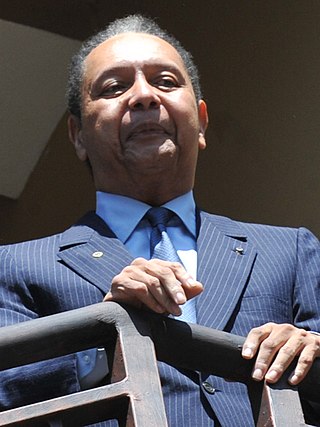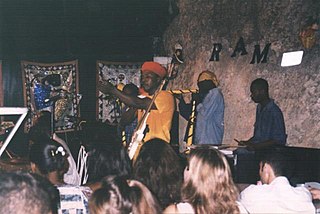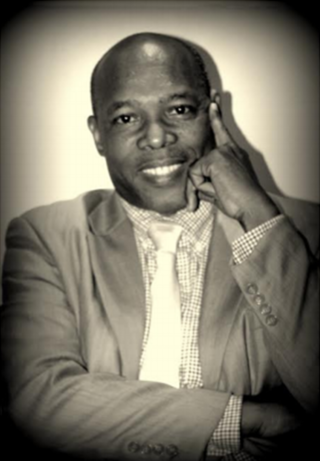Related Research Articles

Jean-Bertrand Aristide is a Haitian former Salesian priest and politician who became Haiti's first democratically elected president. A proponent of liberation theology, Aristide was appointed to a parish in Port-au-Prince in 1982 after completing his studies to become a priest. He became a focal point for the pro-democracy movement first under Jean-Claude "Baby Doc" Duvalier and then under the military transition regime which followed. He won the 1990–91 Haitian general election, with 67% of the vote. As a priest, he taught liberation theology and, as a president, he attempted to normalize Afro-Creole culture, including Vodou religion, in Haiti.

Jean-Claude Duvalier, nicknamed "Baby Doc", was a Haitian politician who was the President of Haiti from 1971 until he was overthrown by a popular uprising in February 1986. He succeeded his father François "Papa Doc" Duvalier as the ruler of Haiti after his death in 1971. After assuming power, he introduced cosmetic changes to his father's regime and delegated much authority to his advisors. Thousands of Haitians were killed or tortured, and hundreds of thousands fled the country during his presidency. He maintained a notoriously lavish lifestyle while poverty among his people remained the most widespread of any country in the Western Hemisphere.

A coup d'état in Haiti on 29 February 2004, following several weeks of conflict, resulted in the removal of President Jean-Bertrand Aristide from office. On 5 February, a rebel group, called the National Revolutionary Front for the Liberation and Reconstruction of Haiti, took control of Haiti's fourth-largest city, Gonaïves. By 22 February, the rebels had captured Haiti's second-largest city, Cap-Haïtien and were besieging the capital, Port-au-Prince by the end of February. On the morning of 29 February, Aristide resigned under controversial circumstances and was flown from Haiti by U.S. military/security personnel. He went into exile, being flown directly to the Central African Republic, before eventually settling in South Africa.
Jean Léopold Dominique was a Haitian journalist and activist for human rights and democracy in Haiti. His station, Radio Haiti-Inter, was the first to broadcast news, investigative reporting, and political analysis in Haitian Creole, the language spoken by most Haitian people. On 3 April 2000 he was assassinated as he arrived for work at Radio Haiti-Inter. An extensive though turbulent investigation failed to officially identify and bring to justice the primary perpetrators, who remain at large.
Jacques Roche, a Haitian journalist and editor for Le Matin newspaper and a host of a TV show in Port-au-Prince, Haiti, was kidnapped, tortured and killed during a wave of abductions carried out before elections. Roche was affiliated with Group of 184 and an opponent of Jean-Bertrand Aristide and his Fanmi Lavalas political party and pro-Lavalas were suspected of carrying out his murder.

The Agronomist is a 2003 American documentary directed by Jonathan Demme about Jean Dominique. The documentary follows the life of Dominique, who ran Haiti's first independent radio station, Radio Haiti-Inter, during multiple repressive regimes.

RAM is a mizik rasin band based in the city of Port-au-Prince, Haiti. The band derives its name from the initials of its founder, songwriter, and lead male vocalist, Richard A. Morse. The band's music has been described by Morse as "Vodou rock 'n' roots", and has been one of the prominent bands in the mizik rasin musical movement in Haiti. RAM began performing together in 1990, and recorded their first album in 1996. The band's music incorporates traditional Vodou lyrics and instruments, such as rara horns and petro drums, into modern rock and roll. The band's songs include lyrics in Haitian Creole, French, and English.
Michèle Montas is a journalist from Haiti and the former Spokesperson under UN Secretary-General Ban Ki-moon. Prior to her appointment, Montas headed the French unit of UN Radio. From 2003 to 2004, she served as the Spokesperson for UN General Assembly President Julian Robert Hunte soon after she fled to New York from Haiti.
As in many developing countries, radio reaches the widest audience in Haiti. Estimates vary, but more than 300 radio stations are believed to broadcast throughout the country. Talk show programs serve as one of the few ways in which ordinary Haitians can speak out about politics and the government. A law passed in 1997 declares the airwaves to be the property of the government, but at least 133 unlicensed radio stations operate freely. In addition, there are 50 community-based stations throughout the country.

Mario Joseph is a Haitian human rights lawyer. Since 1996, he has led the Bureau des Avocats Internationaux (BAI) in Port-au-Prince, which represents political prisoners, impoverished communities, and victims of political violence. In 2006, The New York Times called Joseph "Haiti's most prominent human rights lawyer".

Ady Jean-Gardy is a Haitian social reformer and international press activist. He became Minister of Communication in Haiti (2012–13) after serving as Chief of Staff of the Haitian Ministry of Foreign Affairs. Jean-Gardy designed reforms for public communication without propaganda, respecting human rights organizations and positioned Haiti as an influential member of the African Union at Addis Ababa (Ethiopia). He worked to end civil wars in Africa and promoted a new image of Haiti as an international leader for peace. Ady Jean-Gardy is also the founder of the Haitian Press Federation, an umbrella organization for various Haitian press associations. He founded the Haitian University of Journalism and Social Communication, also known as the Haitian Center for Teaching Journalists.

The 1991 Haitian coup d'état took place on 29 September 1991, when President Jean-Bertrand Aristide, elected eight months earlier in the 1990–91 Haitian general election, was deposed by the Armed Forces of Haiti. Haitian military officers, primarily Army General Raoul Cédras, Army Chief of Staff Philippe Biamby and Chief of the National Police, Michel François led the coup. Aristide was sent into exile, his life only saved by the intervention of US, French and Venezuelan diplomats. Aristide would later return to power in 1994.
The St. Jean Bosco massacre took place in Haiti on 11 September 1988. At least 13 people were killed and around 80 wounded in a three-hour assault on the Saint-Jean Bosco church in Port-au-Prince, which saw the church burned down.
Sony Esteus was a Haitian radio journalist. For seventeen years, he served as executive director of Sosyete Animasyon Kominikayon Sosyal, an organization supporting Haitian community-based radio. At its height, SAKS supported around 30 community radio stations around the country, though many of these faced difficulties and suspended broadcasts following the 2010 earthquake. Esteus also serves as the Caribbean representative of the World Association of Community Radio Broadcasters.
Aristide and the Endless Revolution is a 2005 feature documentary directed and produced by Nicolas Rossier about former Haitian President Jean-Bertrand Aristide and the coup d'etat that ousted him from the country in 2004. Rossier was the first media professional to get exclusive access to Aristide while in exile and the resultant interview is featured in the film, as well as interviews with many experts on Haiti, including U.S. Representative Maxine Waters, noted economist Jeffrey Sachs and Aristide's lawyer Ira J. Kurzban.

The Anti-Duvalier protest movement was a series of demonstrations in Haiti from 23 May 1984 – 7 February 1986 that led to the overthrow of President Jean-Claude Duvalier and the Duvalier dynasty regime and the readoption of the original flag and coat of arms of the country.
Fritz d'Or, or Fritz Dor, was a Haitian American journalist and radio talk show host for WLQY-AM (1320) who was assassinated by Billy Alexander in Miami, Florida, for voicing his support for the new Haitian democracy and the elected Haitian President Jean-Bertrand Aristide, who would be ousted by the military regime led by General Raoul Cédras in September 1991.
Antoine Adrien was a Catholic Priest and liberation theology advocate who served as Father Superior of the Holy Ghost Order in Haiti. He also served as Director of the "Petit Séminaire Collège Saint-Martial", attended primarily by children of the country's elite. Adrien was expelled from Haiti in 1969 by the Francois Duvalier regime which accused the Holy Ghost Order of harboring communists working to overthrow the regime.
Three pro-democracy Haitian radio journalists were assassinated in Little Haiti, Miami, Florida, United States between 1991 and 1993.

Brignol Lindor, was a Haitian radio journalist and news editor, lawyer and teacher. Lindor was a prominent voice in politics, speaking mostly on behalf of the Democratic interests of the Haitian people. His brutal murder was blamed on threats from leftist politicians who supported President Jean-Bertrand Aristide.
References
- ↑ Jean Jean-Pierre (April 11, 2000), "The Sound of Silence", Village Voice
- ↑ "Haitian Radio Station to Close After Renewed Threats to Staff", Reuters, February 22, 2003
- ↑ "Radio Haiti". All Things Considered. February 25, 2003. NPR.